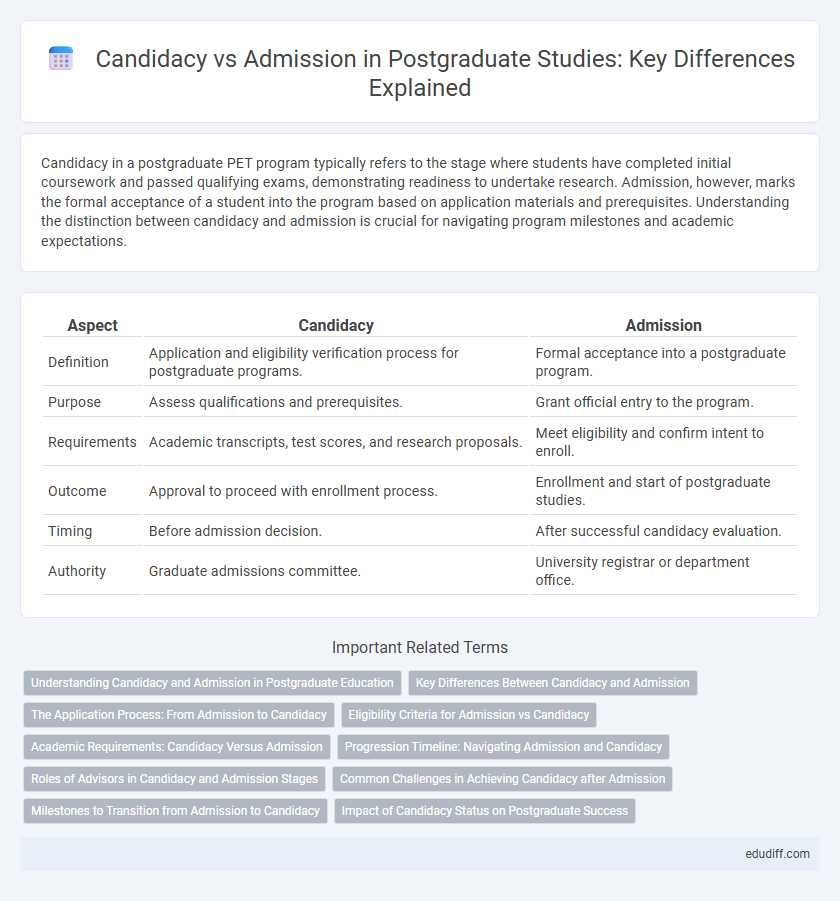Candidacy in a postgraduate PET program typically refers to the stage where students have completed initial coursework and passed qualifying exams, demonstrating readiness to undertake research. Admission, however, marks the formal acceptance of a student into the program based on application materials and prerequisites. Understanding the distinction between candidacy and admission is crucial for navigating program milestones and academic expectations.
Table of Comparison
| Aspect | Candidacy | Admission |
|---|---|---|
| Definition | Application and eligibility verification process for postgraduate programs. | Formal acceptance into a postgraduate program. |
| Purpose | Assess qualifications and prerequisites. | Grant official entry to the program. |
| Requirements | Academic transcripts, test scores, and research proposals. | Meet eligibility and confirm intent to enroll. |
| Outcome | Approval to proceed with enrollment process. | Enrollment and start of postgraduate studies. |
| Timing | Before admission decision. | After successful candidacy evaluation. |
| Authority | Graduate admissions committee. | University registrar or department office. |
Understanding Candidacy and Admission in Postgraduate Education
Understanding candidacy in postgraduate education involves meeting specific academic and research requirements set by the program, demonstrating readiness for independent study and contribution to the field. Admission to a postgraduate program requires fulfilling entry criteria such as prior qualifications, standardized test scores, and application materials, serving as the initial gateway to advanced study. Differentiating candidacy from admission clarifies the progression from meeting basic entry standards to achieving a recognized status that allows for focused research and dissertation work.
Key Differences Between Candidacy and Admission
Candidacy refers to the stage in postgraduate studies where a student has met initial requirements and is officially recognized as a candidate for a degree, often involving the approval of a dissertation proposal. Admission is the process of being accepted into a postgraduate program based on academic qualifications, test scores, and application materials. Key differences include that admission grants entry to the program, while candidacy confirms progress toward degree completion after fulfilling coursework and preliminary evaluations.
The Application Process: From Admission to Candidacy
The application process for postgraduate studies begins with admission, where candidates submit academic records, references, and research proposals for initial evaluation by the admissions committee. Upon acceptance and enrollment, students progress to candidacy by fulfilling coursework requirements, passing qualifying exams, and obtaining approval for a dissertation topic through a comprehensive review process. This transition from admission to candidacy marks a critical milestone, signifying eligibility to undertake independent research leading to a doctoral degree.
Eligibility Criteria for Admission vs Candidacy
Admission to a postgraduate program requires meeting specific eligibility criteria such as holding a relevant bachelor's degree, minimum GPA thresholds, and submission of standardized test scores like the GRE or GMAT. Candidacy eligibility, on the other hand, typically depends on successfully completing required coursework, maintaining a certain academic standing, and passing comprehensive exams to demonstrate readiness for dissertation research. Admission criteria focus on initial qualification for program entry, while candidacy criteria assess progress toward degree completion and research capability.
Academic Requirements: Candidacy Versus Admission
Academic requirements for admission primarily involve meeting baseline qualifications such as a completed undergraduate degree and satisfactory standardized test scores. Candidacy necessitates fulfilling more advanced criteria, including completion of coursework, comprehensive exams, and the approval of a research proposal. Admission is the initial step to enter a postgraduate program, whereas candidacy signifies the transition to active research status within that program.
Progression Timeline: Navigating Admission and Candidacy
Progression timeline in postgraduate studies distinguishes between admission, marking entry into the program, and candidacy, indicating approval to conduct independent research. Admission requires meeting academic prerequisites and often completing coursework, while candidacy involves passing comprehensive exams and proposal defense to demonstrate readiness for dissertation work. Understanding these milestones is crucial for managing expectations and achieving timely degree completion.
Roles of Advisors in Candidacy and Admission Stages
Advisors guide students through the admission process by evaluating academic credentials, research proposals, and aligning candidates with appropriate programs. During the candidacy stage, advisors provide critical mentorship on research direction, methodology, and progress assessment to ensure milestone completion. Their role evolves from evaluative gatekeepers in admission to active supporters and evaluators in candidacy, maximizing student success and academic rigor.
Common Challenges in Achieving Candidacy after Admission
Achieving candidacy after admission in postgraduate programs often faces challenges such as meeting rigorous coursework requirements, passing qualifying examinations, and developing a viable research proposal. Many candidates struggle with time management and securing faculty mentorship, which are critical for progressing from admission to candidacy status. These obstacles can delay research milestones and extend the overall duration of graduate studies.
Milestones to Transition from Admission to Candidacy
Achieving candidacy status in postgraduate studies requires meeting critical milestones such as completing required coursework, passing comprehensive exams, and developing a detailed research proposal. Admission marks the entry into the program, while candidacy signifies readiness to undertake independent research. Successful transition from admission to candidacy demonstrates mastery of foundational knowledge and alignment of research objectives with academic standards.
Impact of Candidacy Status on Postgraduate Success
Candidacy status in postgraduate programs signifies advancement beyond initial admission and reflects a student's readiness to conduct independent research, often correlating with higher completion rates and improved academic performance. Achieving candidacy can provide access to additional resources, mentorship, and funding opportunities, which are critical for successful dissertation development. Studies show that students who attain candidacy timely exhibit stronger engagement and retention, positively impacting overall postgraduate success.
Candidacy vs Admission Infographic

 edudiff.com
edudiff.com